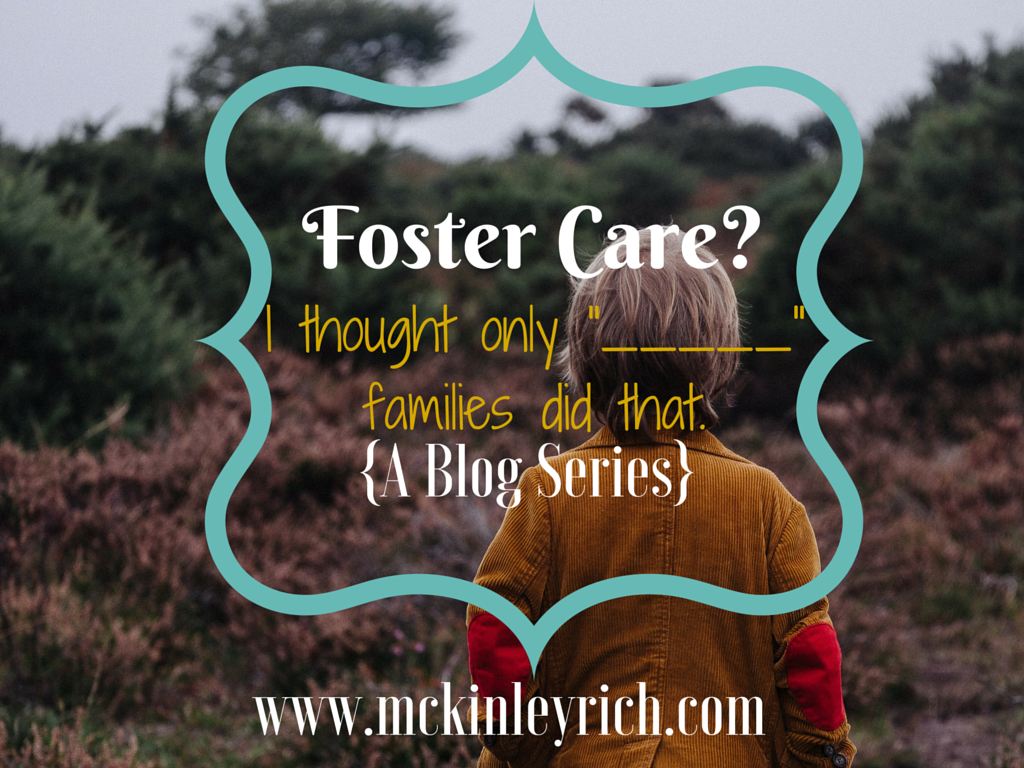|
This is the fifth and final post in a series, "Foster Care? I could never do that". Click here for the previous post. I grew up believing a lot of stereotypes. I believed silly stereotypes like all boys were left-handed and all girls were right-handed, because this theory held true in my own nuclear family. But I also believed extremely insensitive stereotypes like all homeless people were lazy and addicted, because my limited experience with the homeless community reinforced that belief. I guess most kids probably hold on to some stereotypes because they help us to categorize information – especially before we are able to think abstractly. But over time, these ingrained beliefs about people begin to weed away at our ability to care for each other. Stereotypes are hard to fight, and if I’m being honest, I’d rather not enter the ring. It’s so much easier to disengage, avoid, and not draw attention to the ugliness that dwells within these hurtful generalizations. As soon as I feel like I’ve fully confronted one stereotype in my core, I am made aware of another misconception that I hold. For example, when we first considered foster care, I believed that two types of families chose to foster: low-income families who needed the money and saintly, precious, ultraconservative families who homeschooled. I’m not sure where this ridiculous generalization stemmed from, but it was well enough ingrained, that I had a hard time figuring out how we would break that imaginary mold. I was frustrated with the news stories that would show low-income foster families providing inadequate care to the six foster children in the home, all the while receiving thousands of dollars in living stipends. I felt comfortable breaking this stereotype because I knew we wouldn’t be tempted by the money, but I also knew that we are not any where near saintly, and I struggle with my patience and my temper. In many ways, I was fearful that, while I could provide a home with everything a child would need, I wouldn’t be able to love them well. After all, why aren’t more families like us doing it? I think stereotypes are most easily broken when you meet the people who break them. Our friends Mary and Troy had already taken a crack at my imaginary mold before our very eyes. We watched how they beautifully incorporated two little guys into their already-existent family, but still felt the same struggles and frustrations that come with parenting littles. They are neither poor nor saintly and ultra-conservative, but care for their kids incredibly well. They are amazing parents, but still get frustrated and upset when their kids misbehave. They discipline, reinforce, redirect, guide, and teach, while also ensuring their kids aren’t the center of the universe. They understand, like we do, how you can love your children with every ounce of your being without putting them on a pedestal. They have all-star days, and terrible days and will end either one with a glass of wine. They are quality parents with realistic expectations, and completely shattered my beliefs about foster families. Once the mold began to crumble, I began to realize that we, as moderate middle-class families, should be the new stereotype. Not because we are perfect (even though Mary and Troy kind of are), but because we can provide basic needs and also help children navigate the world with an open-mind. What’s even more compelling is that it’s not just about our stable middle-class family. It’s also the fact that we live in a community surrounded by stable middle class families. When I started telling neighbors that we were going to foster, they began throwing things at us – Darla gave us a crib, Katherine handed me a car seat, Haley and Natasha offered up clothes. It was honestly overwhelming. Not one of them asked for a dime in return, but instead rallied around our family as we prepared our home. Our little guy was loved on by so many people before we even saw his face. Unfortunately, low-income families don’t often have this luxury. After all, it’s difficult to give your neighbor a couple eggs when you yourself are waiting for next week’s food stamps. By giving foster children not only a safe home, but also a safe community, we allow them the opportunity to grow in that space. The decision was finally clear to us. God had completely mended my heart by answering all of my prodding questions. There were no more excuses or "what ifs". Once our focus truly zoomed in on the foster child, all of the questions became irrelevant. All previous questions that I asked here, here, and here, were out of my own selfish desires. So we jumped off a cliff. (Or really, God pushed us). And in a lot of ways, we are still falling. We still have fears and anxieties. We sill struggle with the feelings that are associated with loving a child that doesn't share your blood. These are not easy things, but we are in with both feet. Not sure where we will land, but I know with all of my being, caring for foster children is the right thing for our family. And I pray with my whole heart, that it will be the right thing for more and more families just like us. This is the fifth and final post in a series called, "Foster Care? I could never do that". Click here for the previous post.
0 Comments
Leave a Reply. |
McKinleyI am a lover of people, a child of God, and a laugher at jokes. I write words, cry tears and smile at strangers.
Archives
March 2017
Categories
All
|



 RSS Feed
RSS Feed